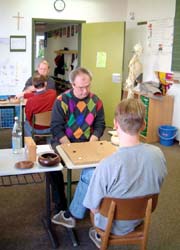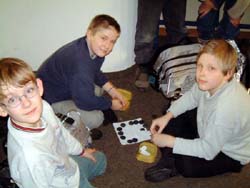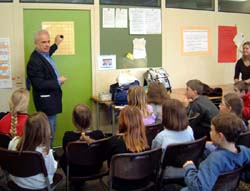 |
|
| Euro | |
 |
|
| Euro | |
|
My Italian Diary: Shigeno Yuki 2-dan |
|
 |
|
| My first trip for go instruction after the currency unification was to two cities, Erding and Ingolstadt, which are near Munich. Together with local go fans, I taught go and introduced Japanese culture at a gymnasium and at the weekend attended a tournament during the day and visited local go clubs for teaching at night. | |
 |
|
| A gymnasium is a school with a unified system for pupils from, in Japanese
terms, fifth grade in elementary school to first year of university, that
is, age 19. There are other kinds of schools, but if you want to go to
university, you have to graduate from a gymnasium. For the last four years, I've been teaching go to the ten-year-olds at this gymnasium. The headmaster is very understanding. This year I spend three days with a local go player named Karl teaching eight classes. Whatever the country, go classes for children are tremendous fun. Children are keenly interested in games and different cultures. They really throw themselves into the experience. |
|
 |
 |
|
I've known Karl since I first came to this school to teach. He founded a go club in the school and comes once a week to teach. He's a top marketing executive in an insurance company, and, even though his position meets that he can be flexible about his working hours, it can't have been easy maintaining this commitment. He also privately bears all the expenses for the go equipment and other costs. There are other people cooperating, but it's basically an individual effort. It's a similar story all over Europe. |
|
 |
|
On this trip, everyone wanted to exchange money for the Italian Euro coins. Unlike the notes, the coins have a common design on one side, while the reverse has different designs for each country and each denomination. That makes them popular. As you would expect of Italy, our coins are artistic, with profiles of Dante and da Vinci. I think they're really stylish. In the case of Germany, the 1 and 2 Euro coins have the same design of the eagle that used to feature on the German mark coins. I wonder if I'm the only person who has to take care not to confuse them. Was keeping the old design for the sake of economy or to honour tradition or to avoid confusion? This gives one a glimpse into national differences. The start of the Euro has made my work a lot easier; what I'm praying for now is for the yen to go up again. |
|